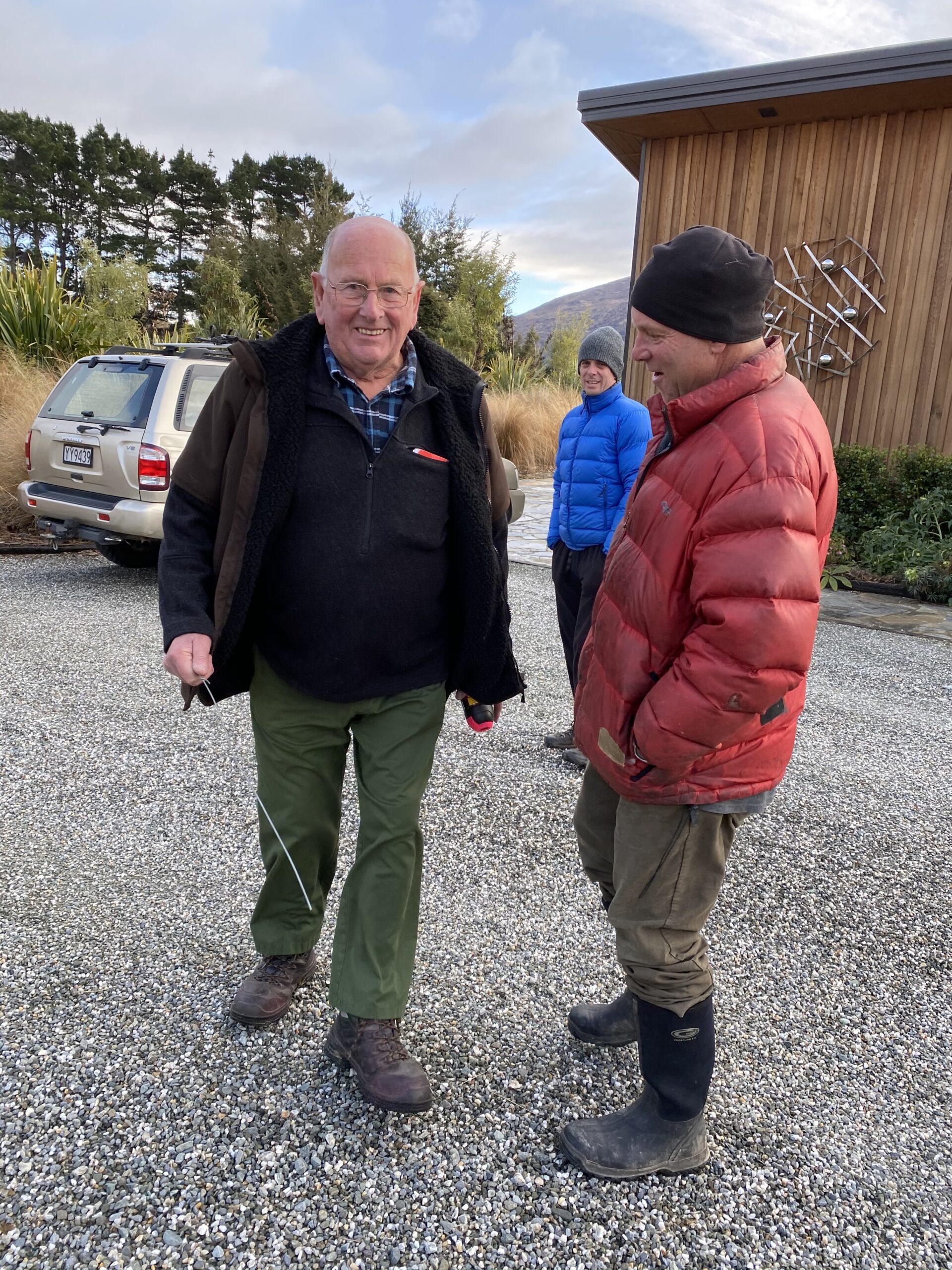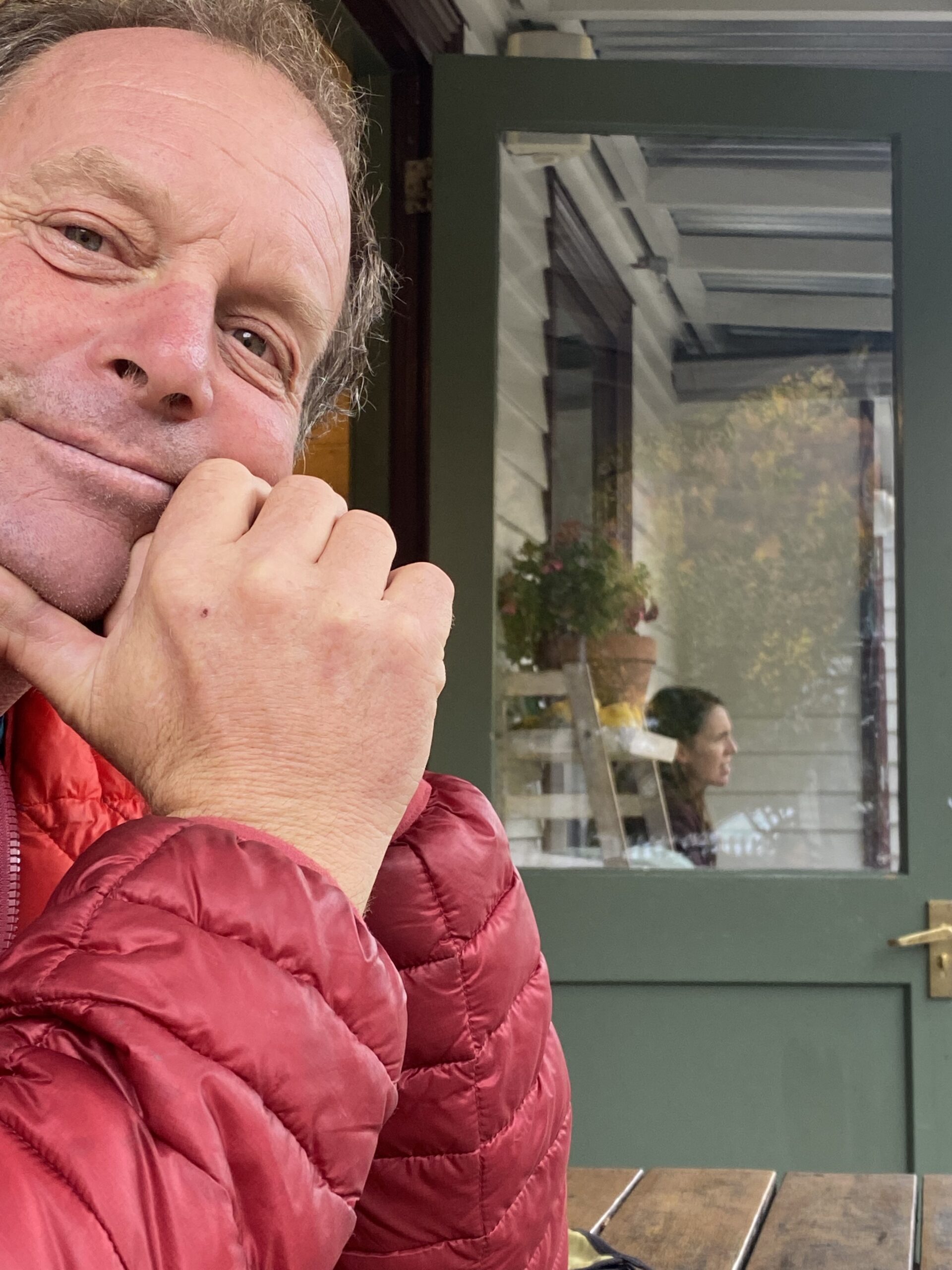Mike the water diviner seeing if his No. 8 wire oscillates with Chris and Kerrin looking on
It turns out that water diviners no longer necessarily use bisected wooden sticks, No. 8 fencing wire will also perform. The question, however, is…what is a household of scientists doing employing a water diviner?
I have been very clear about my scientific approach to matters in life, including COVID-19. I still maintain the way to look at the different ways countries have acted form large scientific experiments and one should investigate the data and try to suspend emotion when assessing comparative data. On that front, I would have to say that the Swedish experiment doesn’t appear to have been a great success for that country. The world is lucky in that we have an example of what happens when you try a degree of mitigation of disease spread without full lockdown. However, few are currently wanting to emulate Sweden.
Contrary to many other countries, Sweden didn’t lock down. High schools and universities closed, but younger children stayed in school, shops stayed open and Swedes were encouraged to socially isolate and stay a few feet away from each other, but to do so voluntarily. The short story has been that more people died of COVID-19 per capita in Sweden than in many other countries, notably compared to Denmark and Norway as other Scandinavian states. The country’s medical system and hospital beds were overwhelmed; there are suggestions that is because elderly people with COVID-19 were frequently not admitted. This supposition is supported by the particularly high numbers of deaths amongst the elderly.
Whether the Swedish economy will fare better, worse or the same as other countries is still not clear. There are forecasts that both say it will do better than countries that locked down, and forecasts suggesting it will do no better than Denmark and Norway. There are likely to be more complex factors at play than lockdown/not lockdown as well when one compares economic effects, making comparisons very difficult and likely inaccurate. Parts of economies reliant on export markets will be affected everywhere; the degree and type of reliance on export markets will be different for each country. Domestic economies will be affected differentially if there are repeated lockdowns as part of mitigation as opposed to a single major lockdown. Different amounts and types of government interventions will also play a role.
The Swedish approach was, potentially, hoping to achieve herd immunity. It is suggested that around 10% of Swedes have antibodies to COVID-19 at present, nowhere near the estimated 60-80% required to achieve herd immunity. Worse, current thinking is that immunity may not last very long – possibly as little as 2 months. This is quite disturbing from the point of view that if immunity is short lived, herd immunity cannot be achieved and a potential vaccine might require such frequent boosters as to be impractical and unaffordable. These findings parallel with short lived immunity to the common cold, another coronavirus.

So there’s my science brain reporting on Sweden for you. Which brain am I using to employ a water diviner? I think I am using my economic brain, which is looking at necessity and costs vs benefits. There is a complex and dysfunctional water scheme that supplies water to the group of 7 houses that we are part of. Some of the dysfunction is in the water infrastructure and some is between the people, as is normal for groups of people. We would really like to reduce our reliance on the water infrastructure, which has led us to consider putting down a bore.
Our neighbours drilled a successful bore last year; my science brain was very happy that they did some proving of the concept for us. Given that we live on a terrace with up to 100m of very free draining gravel beneath us, we didn’t think that they were likely to be successful. It turned out that they found water by drilling into the rock and finding water in crushed bedrock; our household of 2 geologists would never have picked that which shows that we don’t know nearly enough about hydrology. We asked our neighbours how they chose their site and they said, somewhat bashfully, “We used a water diviner (we know you are scientists)”. We scoffed internally and said something like “Yes of course it makes sense to use whatever assistance is available”.
Our next step was to contact the drilling company about costs and logistics of drilling our own bore. They said they could do it, but they would need to have a location for drilling to put into for a consent, and they wouldn’t want to pick the location themselves. They recommended use of a water diviner! They also said that if the water diviner considered that it is unlikely they will find water, they would be very loath to go ahead. I should point out that drilling and completing a water bore costs in the order of $300 per metre, so you can spend a lot of money getting nothing if you don’t strike water.
So, the drilling company won’t tell you where to drill. Getting a geophysical survey done is far more expensive than is warranted for a house supply of water. The only person who will tell you where to drill is a water diviner. However, you can’t hold the water diviner to anything because what would you be holding them to? The accuracy of their ‘feeling’ that there is water in a specific location (as indicated by the rate of rotation of their No. 8 wire)?
Chris and I could make our best guess and put a stake in the ground, but we have little experience in locating water. We can interpret the surrounding landforms and where water might run down the surface but the subsurface is a big unknown. We have also already proved our incompetence in terms of predicting where our neighbours might find water. Our hope is that Mike the water diviner has an intuitive sense of the likelihood of finding water in local landforms, because he has spent 30 years doing just that, including running drilling rigs. What’s a scientist to do?


Discover more from Jane Shearer
Subscribe to get the latest posts sent to your email.




5 thoughts on “A cleft stick”
Firstly Sweden, hasn’t the herd immunity argumet been debunked? I had heard that you could be susceptible several times to Covid, in the same way infectious mononucleosis or chickenpox sits dormant in the body and attacks when the body’s immunity is low? Perhaps as a scientist you can tell me. Swedes are not that social as some western countries and the weather sometimes keeps them indoors more. However, the economy must have taken a hit as Swedes were refused entry into other countries like Denmark and Norway and that would affect them.
Re the water diviner. I tend to have faith in some gut feelings, as my husband’s Aunt used to successfully divine water for the farms in the hinterland behind Ipswich. Her Mother could do so as well and “taught” her as she was the only one of ten children to purportedly have the “gift.” It is a huge gamble but water is a precious commodity. Good luck with your journey finding it.
My blog says exactly the above that we are unlikely to achieve herd immunity in regard to COVID-19 for a number of reasons. ‘Herd immunity has not been ‘debunked’, however, it remains a very valid concept. It just isn’t going to work in practice for this particular disease.
We will find out in a couple of weeks whether there is water in the location he indicated!
Indeed. I shall await the result. I assume I am following you, although I couldn’t see a follow button on your blog?
There used to be one. I will check!
This is a subscribe button on my home page but not, I realise, on the individual blogs. Guess I had better figure out how to do that!